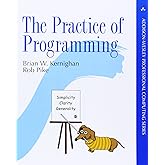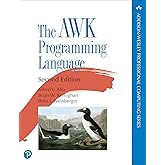
Download the free Kindle app and start reading Kindle books instantly on your smartphone, tablet, or computer - no Kindle device required.
Read instantly on your browser with Kindle for Web.
Using your mobile phone camera - scan the code below and download the Kindle app.

Follow the authors
OK
Software Tools in Pascal Paperback – January 1, 1981
- Print length380 pages
- LanguageEnglish
- PublisherAddison-Wesley Professional
- Publication dateJanuary 1, 1981
- Dimensions9.26 x 6.27 x 0.59 inches
- ISBN-100201103427
- ISBN-13978-0201103427
Book recommendations, author interviews, editors' picks, and more. Read it now
Customers who viewed this item also viewed
Editorial Reviews
From the Back Cover
With the same style and clarity that characterized their highly acclaimed The Elements of Programming Style and Software Tools, the authors have written Software Tools in Pascal to teach how to write good Pascal programs that make good tools. The programs contained in the book are not artificial, but are actual tools that have proved valuable in the production of other programs.
Structured programming and top-down design are emphasized and applied to every program, as are principles of sound design, testing, efficiency, and portability. All of the programs are complete and have been tested directly from the text. The programs are available in machine-readable form from Addison-Wesley.
Software Tools in Pascal is ideal for use in a software engineering course, for a second course in programming, or as a supplement in any programming course. All programmers, professional and student, will find the book invaluable as a source of proven, useful programs for reading and study. Numerous exercises are provided to test comprehension and to extend the concepts presented in the book.
0201103427B04062001
About the Author
Brian W. Kernighan works in the Computing Science Research Center at Bell Laboratories, Lucent Technologies. He is Consulting Editor for Addison-Wesley's Professional Computing Series and the author, with Dennis Ritchie, of The C Programming Language.
P.J. Plauger is President of Whitesmiths, Ltd., New York. Dr. Plauger received a Ph.D. in Nuclear Physics from Michigan State University. He is a member of ACM, the American Physical Society, and the Science Fiction Writers of America.
0201103427AB04062001
Product details
- Publisher : Addison-Wesley Professional; 1st edition (January 1, 1981)
- Language : English
- Paperback : 380 pages
- ISBN-10 : 0201103427
- ISBN-13 : 978-0201103427
- Item Weight : 1.1 pounds
- Dimensions : 9.26 x 6.27 x 0.59 inches
- Best Sellers Rank: #813,944 in Books (See Top 100 in Books)
- #2,430 in Programming Languages (Books)
- #8,112 in Mathematics (Books)
- #22,608 in Philosophy (Books)
- Customer Reviews:
About the authors

Discover more of the author’s books, see similar authors, read book recommendations and more.

P.J. Plauger:
-- began computer programming in 1963 and has largely
earned a living writing and licensing software ever
since.
-- earned an AB in Physics (Princeton) in 1965,
then a PhD in Nuclear Physics (Michigan State) in 1969,
and hasn't done a lick of physic since.
-- began writing textbooks and numerous magazine articles
on computer programming in 1973.
-- began writing science fiction in 1973 and, despite
early acclaim, hasn't found nearly enough time to
write it since.
-- moved to Concord, Massachusetts in 1980 and still
lives there with his wife Tana and sister Margaret.
-- is a member of the American Physical Society, a Life Member of IEEE,
and a Lifetime Active member of SFWA.
-- can be reached at books@plauger.com or www.facebook.com/plaugerbooks.
Customer reviews
Customer Reviews, including Product Star Ratings help customers to learn more about the product and decide whether it is the right product for them.
To calculate the overall star rating and percentage breakdown by star, we don’t use a simple average. Instead, our system considers things like how recent a review is and if the reviewer bought the item on Amazon. It also analyzed reviews to verify trustworthiness.
Learn more how customers reviews work on AmazonTop reviews from the United States
There was a problem filtering reviews right now. Please try again later.
- Reviewed in the United States on August 15, 2012I had this book in my programming library and with some spare time I am implementing each program example from the text in Visual Basic 2010 console based applications, meant to use input output redirection and piping from the command line. There are mild problems with the program examples which are related to the authors using only UNIX systems for writing the programs in Pascal, like a CR is defined as 10 not 13, and is only one character, whereas in Windows a new line is a two character combination of a CR/LF. A new version of getc had to be written to deal with this, so even the very first example program to copy a file from standard input to standard output was flawed as it was written. However, in the last few days, I am finding I am able to learn a lot from the code in the book. It is easy to translate the structured control flow statements from the nonstandard Pascal used in the book to Visual Basic 2010, if you have a good VB textbook handy. The programs are meant to be run from the command line, so you have to know how to use Accessories to get to the command prompt in Windows. The chapters in the book cover simple programs like file copying, counting programs and getting rid of tabs or putting tabs in, then filter programs like a compare, compress, expand and translit program, followed by a files chapter with programs to include, concat, copy using file arguments and a powerful archive program. The next chapters deal with mainly one program per chapter, sorting, finding patterns in text, replacing patterns in text, a console based line editor and a simple formatter that can be expanded by adding additional commands. Using software metrics I have found that the programs are decomposed into routines of an average length of 66 words or 17 lines each and each routine takes me about 28 minutes to type in and test. I haven't found the program code on the Internet, despite it being on the Internet in the past. My main Pascal compiler on my computer is not compatible with the code in this book, especially in the file input and output routines. The choice of a string representation as an array of integers, starting at an index of 1 pervades the whole text, and using a different representation of strings makes writing the programs too difficult. I could translate all the Pascal control flow statements into VB except sets using "in" in Pascal. This I simulated with a boolean expression in an if then statement. The different stages of program design, development and testing are discussed about each program, not in specific chapters solely on design, testing or top-down design, however by implementing each program you learn quite a bit about these subjects from experience. I heartily recommend the book, rating it 5 out of 5.
- Reviewed in the United States on December 3, 2013An excellent exposition of building useful tools for whatever operating system. I was able to build the tools easily, as is, on Linux with Free Pascal, with only a few modifications to the example primitives.
Kernighan does an excellent job sticking with the Pascal standard, and only using extensions when needed for I/O and command line arguments (buried in useful primitives). Standard Pascal has not changed since this book was written, (and most of Kernighan's criticisms of standard Pascal are still valid).
This book is so much better than the Ratfor version. Pascal is such a simpler, more elegant language than PL/I and Fortran. Fortran has changed so significantly than the Fortran used in the original Software Tools, that there's no longer a need for Ratfor. In fact, I found the Ratfor tools easier to write in modern Fortran given the explanations in Software Tools in Pascal than the native explanations in Software Tools.
Software Tools in Pascal is missing the subset Ratfor preprocessor, and the one-time-pad crypt utility, (which were in the Ratfor version). However, Ratfor is no longer needed (for Fortran or Pascal). As for the Ratfor crypt utility, it is useless on Windows, and even on Unix far better examples of cryptographic tools can be found in other texts for whatever platform.
However, as a criticism, the text is laced with C-like primitives that in many cases were not needed, and made the programs more complicated. It also is very Unix centric in some of the assumptions of the tool designs. Though the include program and macro processor provided useful additions to a strict standard Pascal, they were also sometimes the wrong approach in retrospect.
If new to Pascal, this book is actually a good starting point. Kernighan leaves nothing unexplained, has excellent bibliographic references at the end of each chapter, and introduces the Pascal syntax and data types within the text as needed. The overstrike command is an antique (see the POSIX asa utility, which makes a better design for the exercises), but most of the tools are still useful on modern systems.
The purpose of this book is to teach how to build a portable toolset. It succeeds, and provides an entertaining, informative, and detailed read. Pascal was a good choice to replace Ratfor, and the book's timelessness shows. Pascal's shortcomings are easily resolved with, and the tools easily translated to, Modula-2 if a more modern language is desired.
- Reviewed in the United States on July 14, 2009i read this book and felt that i was born at the wrong time. this book not only teaches you how to program tools, but how to be a good programmer. the authors believe (and i also do) that with the right tools, the programming job is always easier.
a tool should be a simple independent program that accepts input and produces output, with no interaction from the user. the concept of redirection and piping (dear to unix and linux users) is recurrent in the text.
because we programmers spend most of our time dealing with text, the tools presented deal with textual input. the reader will learn how to write tools similar to grep, ed, sed, sort, compare, tar, just to name a few.
the text and the code--complete, by the way--are amazingly short. another evidence of the power of tools coupled together.
you won't do much with the code, because it's old pascal and people have already done the right thing. especially with the creation of unix and c.
don't despair if you already know a modern programming language and feel like you are wasting you time on things like module inclusion, string representation, or string handling functions. remember that old pascal did not have these things we now take for granted.








